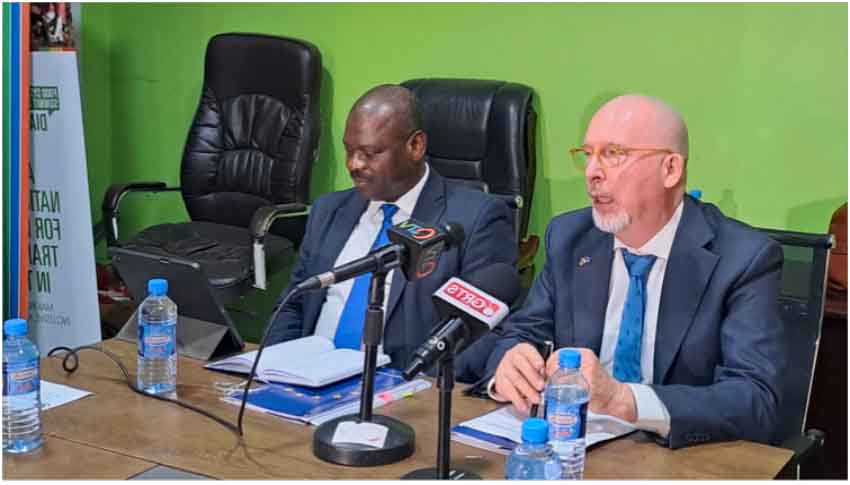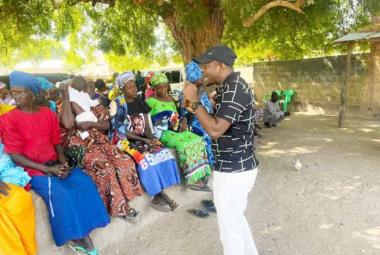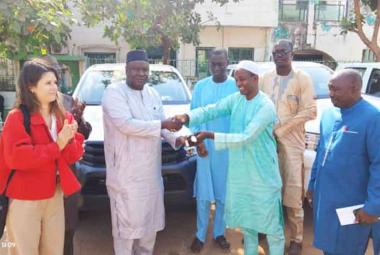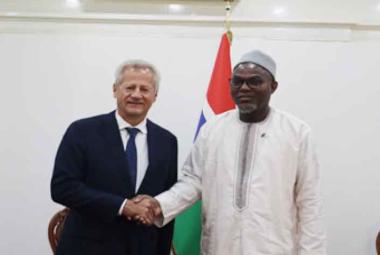By Ebrima S. Jallow
The Minister of Finance and Economic Affairs, Hon. Seedy K.M. Keita, and the European Union Ambassador to The Gambia, His Excellency Corrado Pampaloni recently signed a financing agreement between the European Commission and the Republic of The Gambia for the state and resilience building contract (SRBC4) for The Gambia.
This agreement will oversee the disbursement of some Euros 40 million, with Euros 12 million in this first year, and a budget support component with a maximum EU contribution of EUR 36, 000 000, a complementary support component with a total estimated cost of EUR 4,000,000.
Speaking at the ceremony, Hon. Keita, explained that the SRBC 4 is aimed at supporting the Government of The Gambia (GoTG) towards its common strategic vision of ‘Green Recovery Focus’. He recognized that EU’s interventions have helped economic diversification, boosted production, and improved infrastructure.
Within the agreement, Hon. Keita indicated that public policy, macroeconomic stability, public financial management, budget transparency, and oversight are fully recognised and endorsed as the general conditions of the agreement.
The Minister further noted that the support will ensure the strengthening of transitional justice delivery, curbing migration challenges, social protection, Programme-Based Budgeting (PBB), etc.
In his deliberation, Ambassador Pampaloni expressed honour and optimism, and referenced the event as marking a significant moment in the partnership between the European Union and The Gambia.
“This agreement serves as a tangible manifestation of our shared commitment to fortifying the foundations of governance, stability, and resilience in The Gambia. It is a demonstration of the collaborative spirit that has defined and strengthened our relationship over the years,” said Ambassador Pampaloni.
The State and Resilience Building Contract Four is a testimony to our mutual dedication to building a robust and resilient society, one that is capable of weathering challenges and embracing the opportunities that lie ahead.
According to the EU Chief of Mission, the objectives outlined in the agreement are not just financial commitments but ones embody a shared vision for The Gambia that is not only economically stable but also socially inclusive and politically resilient.
He revealed that they are placing particular emphasis on bolstering key sectors that are integral to sustainable development. These include various reform processes initiated by the Government of The Gambia since 2017. He went on to explain that such reform processes are to strengthen the foundations of justice through the implementation of the recommendations from the Truth, Reconciliation, and Reparations Commission; ensure the efficient implementation of the National Development Plan 2023–2027, a blueprint for a prosperous and inclusive future; expand social protection programmes to cover the most vulnerable segments of The Gambian population; enhance relevance and accountability of Public Financial Management for the delivery of essential services to the citizens of the Gambia and improving migration management, with a specific focus on readmission and reintegration - in recognition of the multifaceted challenges faced by both Europe and The Gambia on irregular migration.
Mr. Pampaloni emphasised that success in endeavours such as this requires a regular and robust dialogue between the EU, the Government, and all stakeholders involved; notably, the services that are instrumental to reach the agreed targets.
He mentioned that constant and reliable communication will be essential to the success of this budget support, noting the importance of agreeing on a joint policy dialogue framework in the forthcoming policy dialogue meeting encompassing all the key areas identified in the Financing Agreement.
In his conclusion, Ambassador Pampaloni called for collective action for all parties involved to work collaboratively and diligently towards the shared vision of a stable, resilient, and citizen-centric Gambia.







